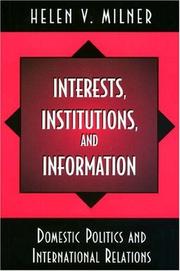| Listing 1 - 3 of 3 |
Sort by
|
Book
ISBN: 9587892410 Year: 2020 Publisher: Barranquilla, Colombia : Editorial Universidad del Norte,
Abstract | Keywords | Export | Availability | Bookmark
 Loading...
Loading...Choose an application
- Reference Manager
- EndNote
- RefWorks (Direct export to RefWorks)
Asistimos a un mundo que parece vivir de manera contradictoria una doble realidad: por un lado, la globalización, proceso que en su cuarta etapa de industrialización es considerado irreversible y, por el otro, una vuelta hacia los localismos y nacionalismos que hasta hace poco tiempo se creían superados. Esta obra se presenta como una recolección de testimonios académicos, cuyo propósito es estimular debates que vayan más allá de las singulares dialécticas disciplinarias, típicas del hacer universitario ortodoxo, a fin de difundir distintos saberes, provenientes de reflexiones e investigaciones muy diferentes. De esta manera se busca acrecentar el debate social y humanista sobre temáticas heterogéneas entre sí, pero puntuales en sus diferentes estudios, para animar una comunión no solo en el ámbito puramente académico, sino también fomentando un diálogo con toda la sociedad civil.
Multiculturalism --- Violence --- Sociology --- Cambio social. --- Violencia --- Afroamericanos --- Conflicto armado --- Cultura --- Política internacional. --- Historia --- Colombia --- Social conditions.

ISBN: 026227132X 0585445257 0262293382 9780262271325 9780585445250 0262042053 9780262042055 0262541335 9780262541336 9780262293389 Year: 2002 Publisher: Cambridge, Mass. MIT Press
Abstract | Keywords | Export | Availability | Bookmark
 Loading...
Loading...Choose an application
- Reference Manager
- EndNote
- RefWorks (Direct export to RefWorks)
If globalization is to be a benefit and not a burden to humankind, it must be governed by global institutions that are perceived by all people to be democratic and just. But before we can create such institutions, we must imagine them, and that requires a rethinking and extension of normative political theory. Global Justice and Transnational Politics encourages and advances that work.The book's first part, "Weak Universalism," contains essays by Amartya Sen and Leif Wenar that offer constructive developments of John Rawls's statement of the principles a liberal polity might reasonably propose to govern its relations with other peoples. The second part, "Strong Universalism and Transnational Commitments," contains essays by Jurgen Habermas, David Luban, Martha Nussbaum, and Thomas Pogge examining the normative sources and possible types of cross-border commitments. In the third part, "Transnational Politics and National Identities," Habermas discusses the possibility of a democratic political order developing within the institutional framework of the European Union; Thomas McCarthy draws on Kant to show how cosmopolitanism might be reconciled with the legacy of nationalism; and Craig Calhoun tries to retrieve a positive aspect of the tradition of nationalism, namely that it provides large populations with a powerful way of imagining political community across space and time.
Political science --- Justice. --- World politics. --- Globalization. --- Justice --- World politics --- Globalization --- Political Science --- Law, Politics & Government --- Political Science Theory --- Philosophy. --- Philosophy --- Global cities --- Globalisation --- Internationalization --- Colonialism --- Global politics --- International politics --- Political history --- Injustice --- Political philosophy --- International relations --- Anti-globalization movement --- World history --- Eastern question --- Geopolitics --- International organization --- Conduct of life --- Law --- Common good --- Fairness --- Política --- Filosofía. --- Justicia. --- Política internacional. --- Globalización. --- SOCIAL SCIENCES/Political Science/Political & Social Theory --- SOCIAL SCIENCES/Political Science/International Relations & Security

ISBN: 069101177X 0691011761 0691214492 9780691011769 9780691011776 Year: 1997 Publisher: Princeton, N.J. Princeton University Press
Abstract | Keywords | Export | Availability | Bookmark
 Loading...
Loading...Choose an application
- Reference Manager
- EndNote
- RefWorks (Direct export to RefWorks)
Interests, Institutions, and Information examines the central factors that influence the strategic game of domestic politics. It shows that it is the outcome of this internal game - not fears of other countries' relative gains or the likelihood of cheating - that ultimately shapes how the international game is played out and therefore the extent of cooperative endeavors. The interaction of the domestic actors' preferences, given their political institutions and levels of information, defines when international cooperation is possible and what its terms will be. Several test cases examine how this argument explains the phases of a cooperative attempt: the initiation, the negotiations at the international level, and the eventual domestic ratification. The book reaches the surprising conclusion that theorists - neo-Institutionalists and Realists alike - have overestimated the likelihood of cooperation among states.
International relations. Foreign policy --- #SBIB:327.1H10 --- #SBIB:327.7H01 --- #SBIB:AANKOOP --- Internationale betrekkingen: theorieën --- Grondslagen, principes, evolutie internationale gemeenschap --- #A0206PO --- Information policy. --- International relations. --- Nation-state. --- World politics --- Information policy --- International relations --- Nation-state --- Information science --- Information services and state --- Communication policy --- National state --- State, The --- National interest --- Self-determination, National --- Coexistence --- Foreign affairs --- Foreign policy --- Foreign relations --- Global governance --- Interdependence of nations --- International affairs --- Peaceful coexistence --- World order --- National security --- Sovereignty --- Government policy --- INTERNATIONAL RELATIONS. --- CASE STUDIES. --- STATES. --- POLITICAL COOPERATION. --- International co-operation. --- Information. --- States. --- International politics. --- Foreign policy. --- Politics. --- Política interna. --- Política internacional. --- Relações internacionais. --- Rationele keuze. --- Politieke instellingen. --- Binnenlandse politiek. --- Internationale samenwerking. --- Theorie --- Nationalstaat --- Internationale Politik --- Interessenpolitik --- World politics. --- Accords internationaux. --- CED = Communaute europeenne de defense. --- Politique de l'information. --- Politique internationale. --- Relations internationales. --- UE/CE CECA. --- UE/CE Traite de Maastricht. --- Unions economiques et monetaires. --- 89.70 international relations: general. --- 89.71 international cooperation: general. --- Information --- Politique mondiale --- Nation. --- Politique gouvernementale. --- Colonialism --- Global politics --- International politics --- Political history --- Political science --- World history --- Eastern question --- Geopolitics --- International organization --- Belgium. --- Bundesbank. --- Chicago Convention. --- Democrats (US). --- Evans, Peter. --- Frieden, Jeffry. --- German rearmament. --- Jacobson, Harold. --- Keohane, Robert. --- Keynes Plan. --- Laver, Michael. --- Lijphart, Arendt. --- Milner, Helen. --- Obstfeld, Maurice. --- Phillips curve. --- Putnam, Robert. --- Rogowski, Ronald. --- Schelling conjecture. --- Truman Administration. --- absolute gains. --- amendment power. --- balance of payments. --- capital mobility. --- cartel. --- domestic politics. --- hierarchy. --- independents. --- interest groups. --- legislature. --- parliamentary systems. --- ratification. --- side payments. --- two-level games. --- World politics - 1989 --- -Information policy --- VIE INTERNATIONALE --- POLITIQUES PUBLIQUES --- REGLES INTERNATIONALES --- POLITIQUE ECONOMIQUE EXTERIEURE --- ORGANISATIONS INTERGOUVERNEMENTALES --- REGIMES INTERNATIONAUX --- Interessenvermittlung --- Lobbyismus --- Interessenverband --- Internationale Beziehungen --- Politische Beziehungen --- Zwischenstaatliche Beziehungen --- Weltpolitik --- Außenpolitik --- Internationales politisches System --- Nationalstaaten --- Staat --- Nationale Einheit --- Praxis
| Listing 1 - 3 of 3 |
Sort by
|

 Search
Search Feedback
Feedback About UniCat
About UniCat  Help
Help News
News